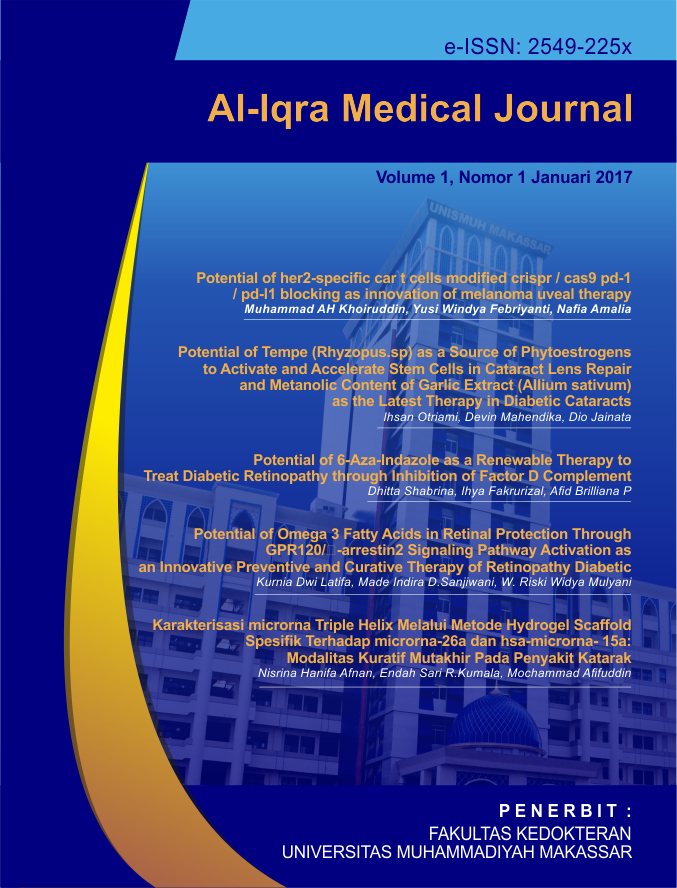MINDFULNESS DENGAN PERILAKU PERAN SAKIT PADA PASIEN PASCA STROKE
DOI:
https://doi.org/10.26618/aimj.v2i2.3957Abstract
Stroke is a common cause of disability and has a large impact on an individual's life. Stroke recovery is very individual and requires a long process. Family support is not enough to give effect to the recovery of post-stroke sufferers, the mindfulness of post-stroke sufferers themselves to recover is also needed. The purpose was determined the relationship between mindfulness with sick role behavior in post-stroke patients with. The subjects were 110 people with characteristics aged 30-65 years. The instruments of this study were the Applied Mindfulness Process Scale (AMPS) and Barcylas Sick Role Process Inventory (BSRPI). The technique of Mediated Multiple Regression was the data analysis. The results showed there was a correlation between mindfulness and sick role behavior (β = 0.51, p < 0.05).
References
Barclay, D. A. (2012). Impact of “sick” and “recovery” roles on brain injury rehabilitation outcomes. Rehabilitation Research and Practice, 20(12), 1–10. https://doi.org/10.1155/2012/725078
Bogousslavsky, J. (2003). William Feinberg lecture 2002: Emotions, mood, and behavior after stroke. The American Heart Association, 34(4), 1046–1050. https://doi.org/10.1161/01.STR.0000061887.3S3505.B9
Bowen, S., Witkiewitz, K., Dillworth, T. M., & Marlatt, G. A. (2007). The role of thought suppression in the relationship between mindfulness meditation and alcohol use. Addictive Behaviors, 32(10), 2324–2328. https://doi.org/10.1016/j.addbeh.2007.01.025
Chriki, L. S., Bullain, S. S., & Stren, T. A. (2006). The recognition and management of psychological reactions to stroke: A case discussion. Journal of Clinical Psychiatry, 8(4), 234–240.
Davis, J. M., Fleming, M. F., Bonus, K. A., & Baker, T. B. (2007). A pilot study on mindfulness based stress reduction for smokers. BMC Complementary and Alternative Medicine, 7(2), 1–7. https://doi.org/10.1186/1472-6882-7-2
Eriksson, H., Milberg, A., Hjelm, K., & Friedrichsen, M. (2016). End of life care for patients dying of stroke: A comparative registry study of stroke and cancer. PLoS ONE, 11(2), 1–10. https://doi.org/10.1371/journal.pone.0147694
Garland, E. L. (2007). The meaning of mindfulness: A second-order cybernetics of stress, metacognition, and coping. Complementary Health Practice Review, 12(1), 15–30. https://doi.org/10.1177/1533210107301740
Greeson, J. M. (2009). Mindfulness research update: 2008. Complementary Health Practice Review, 14(1), 10–18. https://doi.org/10.1177/1533210108329862
Grossman, P., Niemann, L., Schmidt, S., & Walach, H. (2004). Mindfulness-based stress reduction and health benefits: A meta-analysis. Journal of Psychosomatic Research, 57(1), 35–43. https://doi.org/10.1016/S0022-3999(03)00573-7
Hayes, S. C., Luoma, J. B., Bond, F. W., Masuda, A., & Lillis, J. (2006). Acceptance and commitment therapy: Model, processes and outcomes. Behaviour Research and Therapy, 44(1), 1–25. https://doi.org/10.1016/j.brat.2005.06.006
Lengacher, C. A., Johnson-Mallard, V., Post-White, J., Moscoco, M. S., Jacobsen, P. B., Klein, T. W., … Kip, K. E. (2009). Randomized controlled trial of mindfulness-based stress reduction (MBSR) for survivors of breast cancer. Psycho-Oncology, 18(12), 1261–1272. https://doi.org/10.1002/pon.1529
Leung, D. P. K., & Liu, K. P. Y. (2011). Review of self-awareness and its clinical application in stroke rehabilitation. International Journal of Rehabilitation Research, 34(3), 187–195. https://doi.org/10.1097/MRR.0b013e3283487f31
Ludwig, D. S., & Kabat-Zinn, J. (2008). Mindfulness in medicine. Jama, 300(11), 1350–1352. https://doi.org/10.1001/jama.300.11.1350
Maine, M., McGilley, B. H., & Bunnell, D. W. (2010). Treatment of Eating Disorders: Bridging The Research-Practice Gap. London: Academic Press.
Mant, J., Winner, S., Roche, J., & Wade, D. T. (2005). Family support for stroke: One year follow up of a randomised controlled trial. Journal of Neurology, Neurosurgery & Psychiatry, 76(7), 1006–1008. https://doi.org/10.1136/jnnp.2004.048991
National-Stroke-Association. (2012). Stroke Recovery. Retrieved August 3, 2016, from http://www.stroke.org/we-can-help/survivors/stroke-recovery
Ruff, K. M., & Mackenzie, E. R. (2009). The role of mindfulness in healthcare reform: A policy paper. Explore: The Journal of Science and Healing, 5(6), 313–323. https://doi.org/10.1016/j.explore.2009.10.002
Ryan, R. M., Kuhl, J., & Deci, E. L. (1997). Nature and autonomy: An organizational view of social and neurobiological aspects of self-regulation in behavior and development. Development and Psychopathology, 9(4), 701–728. https://doi.org/10.1017/S0954579497001405
Sarah, G., & Clark, L. (2011). Psychological care after stroke: Improving stroke services for people with cognitive and mood disorders. NHS Improvement - Stroke, 1–28.
Shapiro, S. L., & Carlson, L. E. (2009). The Art and Science of Mindfulness: Integrating Mindfulness Into Psychology and the Helping Professions. Washington, DC: American Psychological Association.
Shapiro, S. L., Walsh, R., & Britton, W. B. (2003). An analysis of recent meditation research and suggestions. Journal for Meditation Researches, 3(2), 69–90.
Winarsunu, T. (2006). Statistik dalam Ilmu Penelitian Psikologi dan Pendidikan. Malang: UMM Press.

